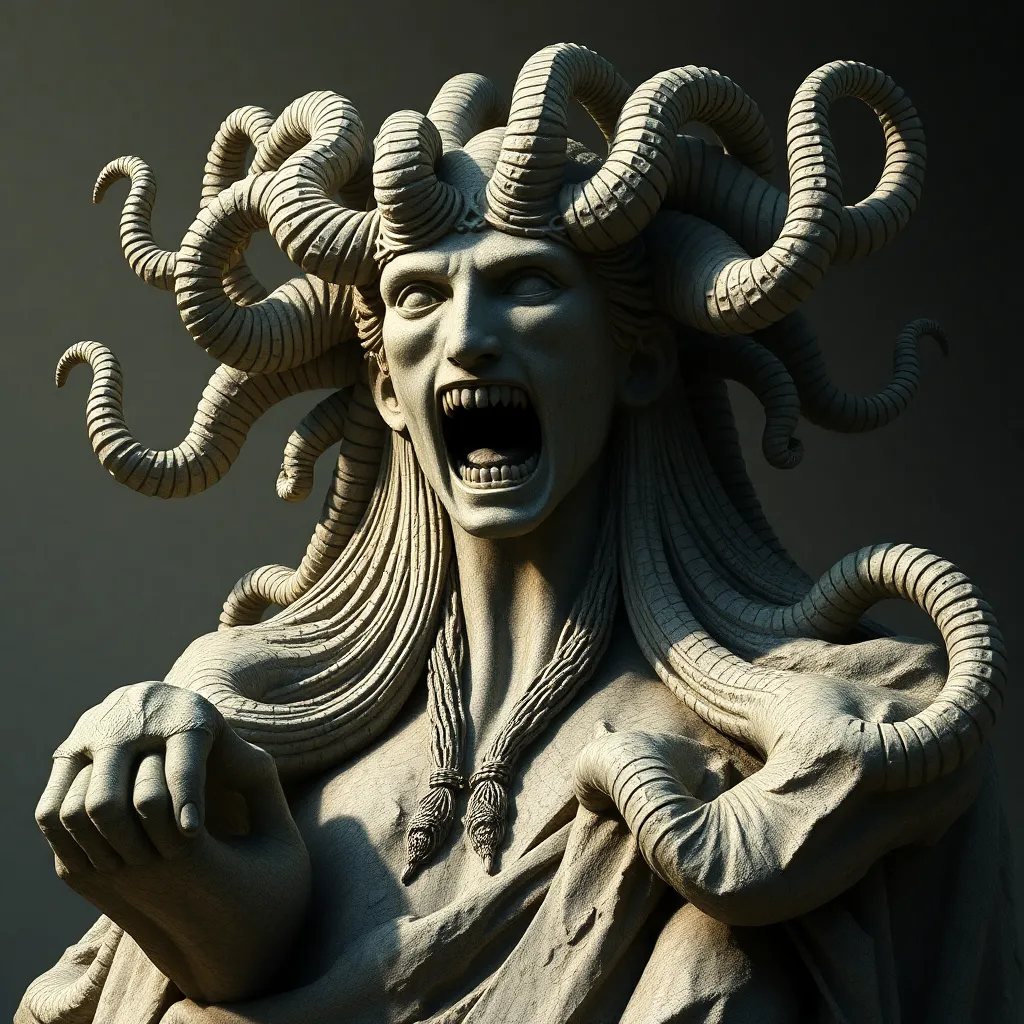Medusa’s Place in the Canon of Greek Mythology
I. Introduction
Greek mythology is a rich tapestry of stories, characters, and themes that have shaped literature, art, and culture for centuries. It provides insight into the ancient Greek worldview and reflects human experiences, emotions, and moral dilemmas. Among its myriad figures, Medusa stands out as a central character whose story has captivated audiences through the ages.
This article aims to explore Medusa’s role in Greek mythology, examining her origins, symbolism, artistic representations, and lasting legacy. By understanding Medusa, we can gain a deeper insight into the complexities of gender, power, and transformation in ancient narratives.
II. Medusa’s Origins and Mythological Background
Medusa’s story begins with her birth and lineage, which is steeped in mythological significance. She is one of the three Gorgon sisters, daughters of Phorcys and Ceto, primordial sea deities. Unlike her sisters, Stheno and Euryale, who were born monstrous from the start, Medusa was originally a beautiful maiden.
Her transformation into a Gorgon was a result of a curse placed upon her by the goddess Athena. According to some versions of the myth, this punishment was inflicted after Medusa was violated by Poseidon in Athena’s temple. As a result, Athena transformed Medusa into a creature with snakes for hair, whose gaze could turn anyone to stone. This transformation illustrates the harshness of divine retribution and reflects the complex relationships between gods and mortals.
III. The Symbolism of Medusa
Medusa embodies several layers of symbolism that resonate deeply within the framework of Greek mythology:
- Representation of Female Rage and Empowerment: Medusa’s transformation can be seen as a manifestation of rage against the injustices faced by women. Her monstrous form symbolizes the anger and pain inflicted upon her, challenging the patriarchal narratives that often vilify female figures.
- The Duality of Beauty and Monstrosity: Medusa’s story highlights the tension between beauty and horror. Once a symbol of beauty, her transformation into a Gorgon reflects society’s fear of powerful women who defy traditional roles.
- Context of Ancient Greek Views on Femininity: Medusa serves as a lens through which we can examine ancient Greek attitudes toward women. Her punishment illustrates the consequences of female sexuality and the societal need to control and define femininity.
IV. Medusa in Art and Literature
Medusa’s image has been a powerful motif in both ancient and contemporary art and literature:
- Depictions in Ancient Greek Art: Medusa was frequently represented in sculptures, pottery, and mosaics. Artists depicted her with snakes writhing from her head, emphasizing her fearsome power. The Gorgon head was often used as an apotropaic symbol, believed to ward off evil.
- Influence on Classical Literature: Medusa appears in various ancient texts, including Ovid’s “Metamorphoses” and Hesiod’s “Theogony.” Her story serves as a cautionary tale about the consequences of angering the gods and the complexities of beauty and monstrosity.
- Modern Reinterpretations: In contemporary culture, Medusa’s image has been reimagined in films, novels, and visual arts. These adaptations often explore themes of empowerment, feminism, and the reclaiming of her narrative.
V. Medusa’s Role in Heroic Narratives
Medusa’s most famous narrative is her encounter with the hero Perseus:
- The Myth of Perseus: Perseus, tasked with slaying Medusa, represents the archetypal hero. His journey to confront Medusa involves overcoming fear and embodying valor. The use of a reflective shield to avoid her deadly gaze underscores the themes of cleverness and strategy in heroism.
- Significance of Her Head: After her death, Medusa’s head becomes a potent weapon for Perseus. It serves as both a protective symbol and a reminder of her power. The head is often depicted as a talisman, evoking fear and respect.
- Implications for Heroic Portrayal: The defeat of Medusa raises questions about the portrayal of female figures in heroic narratives. While Perseus is celebrated as a hero, Medusa’s tragic transformation and death illustrate the complex dynamics of power, gender, and morality.
VI. Medusa’s Legacy in Contemporary Culture
In modern times, Medusa has emerged as a potent symbol in various cultural discourses:
- Modern Feminism: Medusa has been embraced by feminist movements as a symbol of female resilience and empowerment. Her story is often reframed to highlight her victimization and the injustices faced by women.
- Reimagining in Media: Medusa’s character has been explored in films, literature, and visual arts, often portraying her as a misunderstood figure rather than a mere monster. These reinterpretations challenge traditional narratives and encourage discussions about female identity and strength.
- Symbol of Resilience: Medusa represents the power of transformation and survival. Her legacy continues to inspire many, serving as a reminder of the complexities of women’s experiences and the potential for reclaiming one’s narrative.
VII. Comparative Analysis with Other Mythological Figures
Medusa’s story can be compared to other mythological figures, providing further depth to her character:
- Similarities with Other Gorgon Sisters: While Medusa is the most famous, her sisters, Stheno and Euryale, share the Gorgon traits. However, Medusa’s unique narrative of transformation and victimization sets her apart.
- Parallels with Other Female Figures: Medusa’s tale resonates with other mythological characters like Lilith or Circe, who also represent female power and complexity. These figures challenge traditional gender roles and highlight the dual nature of femininity.
- Unique Position in Greek Mythology: Medusa occupies a distinct space within the pantheon of Greek mythology. Her transformation from beauty to monster and her subsequent legacy illustrate the multifaceted nature of feminine power.
VIII. Conclusion
Medusa’s significance in Greek mythology extends far beyond her monstrous image. Her story encapsulates themes of beauty, rage, power, and transformation, making her a compelling figure throughout history. As we reflect on her evolving image in cultural narratives, we recognize that Medusa remains a symbol of resilience and empowerment.
Ultimately, Medusa’s legacy endures in contemporary society, where she continues to inspire discussions about femininity, power, and the reclamation of narratives. Her story serves as a reminder of the complexities of identity and the enduring impact of myth on our understanding of the human experience.




